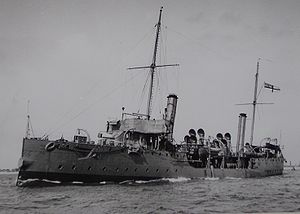HMS Dryad (1893)
 HMS Dryad underway in wartime grey paint | |
| Career (United Kingdom) | |
|---|---|
| Name: | HMS Dryad |
| Builder: | Chatham Dockyard |
| Laid down: | 15 April 1893[1] |
| Launched: | 22 November 1893 |
| Commissioned: | 21 July 1894[1] |
| Renamed: | HMS Hamadryad in 1918 |
| Honours and awards: | Proserpine (1796), Abyssinia (1868) |
| Fate: | Broken up in 1920 |
| General characteristics | |
| Class and type: | Dryad-class torpedo gunboat |
| Tons burthen: | 1070 tons |
| Length: | 262 ft 6 in (80.01 m) |
| Beam: | 30 ft 6 in (9.30 m) |
| Draught: | 13 ft (4.0 m) |
| Installed power: | 3,500 ihp (2,600 kW)[1] |
| Propulsion: |
|
| Speed: | 18.2 kn (33.7 km/h) |
| Complement: | 120 |
| Armament: |
|
HMS Dryad was the name ship of the Dryad-class torpedo gunboats. She was launched at Chatham Dockyard on 22 November 1893,[2] the first of the class to be completed. She served as a minesweeper during World War I and was broken up in 1920.
Contents
Design
Ordered under the Naval Defence Act of 1889, which established the "Two-Power Standard", the class was contemporary with the first Torpedo Boat Destroyers. With a length overall of 262 ft 6 in (80.01 m),[1] a beam of 30 ft 6 in (9.30 m)[1] and a displacement of 1,070 tons,[1] these torpedo gunboats were not small ships by the standard of the time; they were larger than the majority of World War I destroyers. Dryad was engined by Maudslay, Sons & Field with two sets of vertical triple-expansion steam engines, two locomotive-type boilers, and twin screws. This layout produced 3,500 indicated horsepower (2,600 kW),[1] giving her a speed of 18.2 knots (33.7 km/h).[1] She carried between 100 and 160 tons of coal and was manned by 120 sailors and officers.[1]
Armament
The armament when built comprised two QF 4.7-inch (12 cm) guns, four 6-pdr guns and a single 5-barrelled Nordenfelt machine gun. Her primary weapon was five 18-inch (460 mm) torpedoes, with two reloads.[1] On conversion to a minesweeper in 1914 two of the five torpedoes were removed.[1]
History
Mediterranean Service
On 14 January 1900 Dryad left Chatham for the Mediterranean in order to relieve HMS Hussar, which returned to Devonport to pay off[3].
In 1906 she was chosen as the tender to the Navigation School, conducting navigation training of officers at sea. In due course her name came to be used for the Navigation School itself, and then for HMS Dryad, the shore establishment at Southwick House in Hampshire.
Wartime service as a minesweeper
By 1914 Dryad had been converted to a minesweeper and was operating in the North Sea from the port of Lowestoft.
Gunner Ernest Martin Jehan and three other gunners from Dryad were assigned to the Q-ship Inverlyon, with Jehan in command.[4] On 15 August 1915 they sank the German submarine Template:SMU with gunfire.[4] Jehan was awarded the Distinguished Service Cross for his part in the action.[5]
Disposal
She was renamed HMS Hamadryad in 1918 and was sold to H Auten & Co on 24 September 1920 for breaking.[1]
Commanding Officers
| From | To | Captain |
|---|---|---|
| 1911? | Captain Edward Booty[6] |
Notes
- ↑ 1.00 1.01 1.02 1.03 1.04 1.05 1.06 1.07 1.08 1.09 1.10 1.11 1.12 1.13 Winfield, Rif; Lyon, David (2003). The Sail and Steam Navy List, 1815-1889. Chatham Publishing. ISBN 978-1861760326.
- ↑ "Battleships-cruisers.co.uk". http://www.battleships-cruisers.co.uk/r_n_gunboats.htm. Retrieved 2008-05-13.
- ↑ "Index of 19th Century Naval Vessels". http://www.pbenyon.plus.com/18-1900/D/01483.html. Retrieved 2008-05-13.
- ↑ 4.0 4.1 Perkins, Hugh (September 2008). "The gunner and the U-boat". Sea Classics (Canoga Park, California: Challenge Publications). OCLC 60621086. http://findarticles.com/p/articles/mi_qa4442/is_200809/ai_n28081405?tag=content;col1. Retrieved 5 March 2009.
- ↑ London Gazette: no. 32114, p. 10754, 5 November 1920. Retrieved on 6 March 2009.
- ↑ Time Restored: The Harrison Timekeepers and R.T. Gould, the Man who Knew (Almost) Everything, by Jonathan Betts, published by Oxford University Press, 2006, ISBN 0198568029
References
- Colledge, J. J.; Warlow, Ben (2006) [1969]. Ships of the Royal Navy: the complete record of all fighting ships of the Royal Navy (Rev. ed.). London: Chatham. ISBN 9781861762818. OCLC 67375475.
| ||||||||
